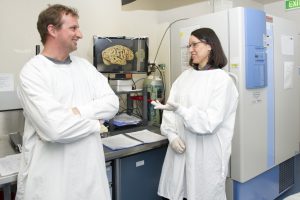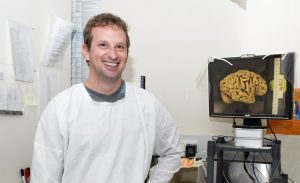Since establishment in 2011 Shake It Up has committed over $1M to Parkinson’s research in Australia.
Through our partnership with The Michael J. Fox Foundation for Parkinson’s Research (MJFF) we know that this research is world’s best and strategically important in the quest for better treatments and ultimately a cure for Parkinson’s.
Funding of this research has been made possible by the generous support of individuals, families and businesses right across the country – many whom have a personal connection to Parkinson’s.
We understand that by making a contribution and supporting our Foundation, like us you are passionate about finding a cure. For this reason we will be sharing updates with you over the next few weeks specifically about the Australian research we (and you) are funding.
We hope it shows you just how you are making a difference and that it inspires you to keep doing what you can to contribute to this vital research.
Our first update is from NeuRA where Professor Glenda Halliday and Dr Nicholas Dzamko are conducting world leading LRRK2 research:
What area of Parkinson’s are you researching?
We currently have three projects funded by Shake It Up Australia and MJFF. They are all conducting research into a protein called “leucine-rich repeat kinase 2”, which we abbreviate to LRRK2 and pronounce “lerk-2”.
Why is this research important?
In 2004 it was discovered that if people had a certain genetic difference (a mutation) in the LRRK2 protein, they were at much greater risk of getting Parkinson’s disease. Only a few percent of all Parkinson’s cases are directly due to LRRK2 mutations, however, we now have a strong clue of where to look for things that go wrong in Parkinson’s patients. Understanding what LRRK2 does and what it may do differently in Parkinson’s patients is a big research priority, especially as drugs are being generated that can block LRRK2 function.
What are you trying to discover?
Collectively, our projects aim to understand the LRRK2 protein and whether drugs that block LRRK2 could be used to treat Parkinson’s disease.
Our first project is to expand on our breakthrough discovery involving a way to test the potency of LRRK2 blocking drugs. If successful, our test will become the gold standard for measuring LRRK2 blocking drugs. Being able to quickly and efficiently measure if LRRK2 blocking drugs are working inside of cells is an essential first step for any future possible clinical trials.
Our second project involves investigating LRRK2 in the brain of Parkinson’s disease patients. We are measuring how the LRRK2 protein may change in different areas of the brain affected by Parkinson’s disease. Knowing when changes in the LRRK2 protein may occur, and how they contribute to the cause of Parkinson’s disease, is important so we know the best times in the disease process to administer drugs.
Our third project aims to better understand the function of LRRK2. Our research shows that LRRK2 may regulate the biological process of inflammation. As part of a worldwide consortium we are measuring inflammatory markers in the blood of Parkinson’s patients with LRRK2 mutations. Moreover, we are measuring the same markers in people that have a LRRK2 mutation, but have not yet developed clinical Parkinson’s symptoms. By looking for changes in the blood of this group of people we may find some of the earliest signs of Parkinson’s disease yet. The earlier the disease can be detected, the earlier it can be treated.
Where is the research up to?
Our test for LRRK2 blocking drugs is now being used worldwide, including by the pharmaceutical industry, where it has aided in the development of prototype LRRK2 blocking drugs. With funding from the Shake It Up Foundation we have recently published more research results showing that the LRRK2 protein is high in blood cells. We are now exploiting this to develop a simple blood test for potential use in Parkinson’s patients that will tell if drugs are indeed blocking LRRK2.
To examine LRRK2 in brain we are leading a multi-national collaboration involving researchers from the US, UK, Europe and Japan. Together, we have just assembled a unique collection of brain tissue that will allow us to investigate LRRK2 in Parkinson’s brain on a bigger scale than ever before.
Likewise, our project to look at inflammatory markers in Parkinson’s patients involves researchers from the US and Europe. Again we are assembling a unique collection of blood samples to be shipped to Sydney for analysis. This analysis will take 6 months and the results of the study will be made available to researchers worldwide over the internet.
Shake It Up has been supporting research at the NeuRA since 2011, watch this news story to find out more:
We hope that this update helps you to better understand the research you are supporting.




